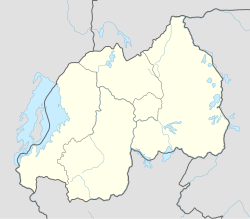Sainte-Famille Church
| Sainte-Famille Church | |
|---|---|
 Sainte-Famille Church, Kigali | |
| Denomination | Catholic |
| Churchmanship | Presbyterian |
| History | |
| Dedication | Catholic parish |
Sainte-Famille Church (Holy Family Church) is a Catholic church in Kiyovu, downtown Kigali, in Rwanda. It is located on a hill, close to the commercial district of Ruhenge. Sainte-Famille Church was the scene of killings during the genocide in April 1994.
Architecture
The building is constructed from red brick, but its facade is embellished with white panels. Besides the parish church, it also includes a visitor centre, a clinic, a primary school, a driving school and buildings leased to individuals by the parish.
History
Constructed in 1913, the building is one of the largest churches in the city.

During the genocide of 1994 thousands of Tutsi and Hutu took refuge in the church and many were massacred, following the death of President Juvénal Habyarimana.[1] Witnesses said that the priest in charge of the church, Father Wenceslas Munyeshyaka, armed himself and helped Hutu militias take people from the church to be killed.[2] Munyeshyaka was responsible for many of the killings, agreeing to "let the militia pick off those they wanted every now and then."[3][4][5] Wenceslas Munyeshyaka hated the Tutsis and called them the inyenzis.[6]
Following this incident and similar ones in other churches, many of the Rwandan people converted to Islam. Speaking ten years later, father Antoine Kambanda, director of the local branch of the Caritas charity, acknowledged that some members of the Catholic church had been involved in the killings, although others had done what they could to prevent them.[2]
References
- ^ Morel, Jacques (June 2010). La France Au Coeur du Génocide des Tutsi. MOREL Jacques. p. 1417. ISBN 978-2-84405-242-1. Retrieved 20 March 2013.
- ^ a b Robert Walker (1 April 2004). "Rwanda's religious reflections". BBC. Retrieved 21 March 2013.
- ^ The Rotarian. Rotary International. December 2004. p. 45. ISSN 0035-838X. Retrieved 20 March 2013.
- ^ Rucyahana, John (6 March 2007). The Bishop of Rwanda. Thomas Nelson Inc. p. 111. ISBN 978-1-4185-7326-3. Retrieved 20 March 2013.
- ^ "Sainte Famille Church". Genocide archive Rwanda.org. Retrieved 21 March 2013.
- ^ Jacques Pauw (2006). Dances With Devils: A Journalist's Search for Truth. Zebra. pp. 107–. ISBN 978-1-77007-330-2. Retrieved 21 March 2013.

